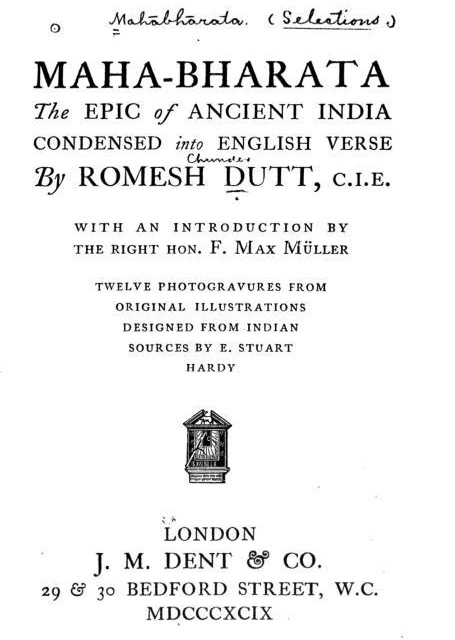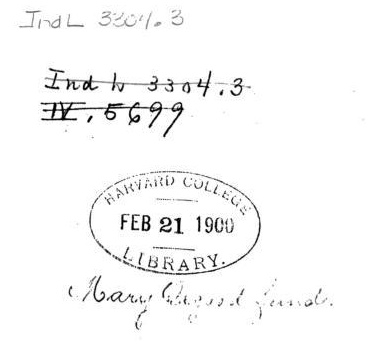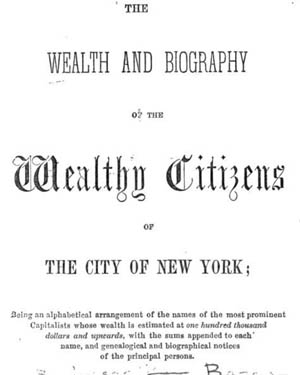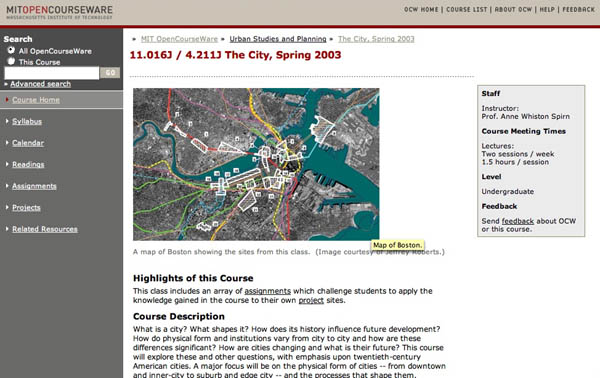…I realize I was over-hasty in dismissing the recent additions made since book scanning resumed earlier this month. True, many of the fine wines in the cellar are there only for the tasting, but the vintage stuff can be drunk freely, and there are already some wonderful 19th century titles, at this point mostly from Harvard. The surest way to find them is to search by date, or by title and date. Specify a date range in advanced search or simply enter, for example, “date: 1890” and a wealth of fully accessible texts comes up, any of which can be linked to from a syllabus. An astonishing resource for teachers and students.
The conclusion: Google Print really is shaping up to be a library, that is, of the world pre-1923 — the current line of demarcation between copyright and the public domain. It’s a stark reminder of how over-extended copyright is. Here’s an 1899 english printing of The Mahabharata:

A charming detail found on the following page is this old Harvard library stamp that got scanned along with the rest:

Category Archives: Copyright and Copyleft
google print’s not-so-public domain
 Google’s first batch of public domain book scans is now online, representing a smattering of classics and curiosities from the collections of libraries participating in Google Print. Essentially snapshots of books, they’re not particularly comfortable to read, but they are keyword-searchable and, since no copyright applies, fully accessible.
Google’s first batch of public domain book scans is now online, representing a smattering of classics and curiosities from the collections of libraries participating in Google Print. Essentially snapshots of books, they’re not particularly comfortable to read, but they are keyword-searchable and, since no copyright applies, fully accessible.
The problem is, there really isn’t all that much there. Google’s gotten a lot of bad press for its supposedly cavalier attitude toward copyright, but spend a few minutes browsing Google Print and you’ll see just how publisher-centric the whole affair is. The idea of a text being in the public domain really doesn’t amount to much if you’re only talking about antique manuscripts, and these are the only books that they’ve made fully accessible. Daisy Miller‘s copyright expired long ago but, with the exception of Harvard’s illustrated 1892 copy, all the available scanned editions are owned by modern publishers and are therefore only snippeted. This is not an online library, it’s a marketing program. Google Print will undeniably have its uses, but we shouldn’t confuse it with a library.
(An interesting offering from the stacks of the New York Public Library is this mid-19th century biographic registry of the wealthy burghers of New York: “Capitalists whose wealth is estimated at one hundred thousand dollars and upwards…”)
the creeping (digital) death of fair use
Meant to post about this last week but it got lost in the shuffle… In case anyone missed it, Tarleton Gillespie of Cornell has published a good piece in Inside Higher Ed about how sneaky settings in course management software are effectively eating away at fair use rights in the academy. Public debate tends to focus on the music and movie industries and the ever more fiendish anti-piracy restrictions they build into their products (the latest being the horrendous “analog hole”). But a similar thing is going on in education and it is decidely under-discussed.
Gillespie draws our attention to the “Copyright Permissions Building Block,” a new add-on for the Blackboard course management platform that automatically obtains copyright clearances for any materials a teacher puts into the system. It’s billed as a time-saver, a friendly chauffeur to guide you through the confounding back alleys of copyright.
But is it necessary? Gillespie, for one, is concerned that this streamlining mechanism encourages permission-seeking that isn’t really required, that teachers should just invoke fair use. To be sure, a good many instructors never bother with permissions anyway, but if they stop to think about it, they probably feel that they are doing something wrong. Blackboard, by sneakily making permissions-seeking the default, plays to this misplaced guilt, lulling teachers away from awareness of their essential rights. It’s a disturbing trend, since a right not sufficiently excercised is likely to wither away.
Fair use is what oxygenates the bloodstream of education, allowing ideas to be ideas, not commodities. Universities, and their primary fair use organs, libraries, shouldn’t be subjected to the same extortionist policies of the mainstream copyright regime, which, like some corrupt local construction authority, requires dozens of permits to set up a simple grocery store. Fair use was written explicitly into law in 1976 to guarantee protection. But the market tends to find a way, and code is its latest, and most insidious, weapon.
Amazingly, few academics are speaking out. John Holbo, writing on The Valve, wonders:
Why aren’t academics – in the humanities in particular – more exercised by recent developments in copyright law? Specifically, why aren’t they outraged by the prospect of indefinite copyright extension?…
…It seems to me odd, not because overextended copyright is the most pressing issue in 2005 but because it seems like a social/cultural/political/economic issue that recommends itself as well suited to be taken up by academics – starting with the fact that it is right here on their professional doorstep…
Most obviously on the doorstep is Google, currently mired in legal unpleasantness for its book-scanning ambitions and the controversial interpretation of fair use that undergirds them. Why aren’t the universities making a clearer statement about this? In defense? In concern? Soon, when search engines move in earnest into video and sound, the shit will really hit the fan. The academy should be preparing for this, staking out ground for the healthy development of multimedia scholarship and literature that necessitates quotation from other “texts” such as film, television and music, and for which these searchable archives will be an essential resource.
Fair use seems to be shrinking at just the moment it should be expanding, yet few are speaking out.
google is sued… again
This time by publishers. Penguin Group USA, McGraw-Hill, Pearson Education, Simon & Schuster and John Wiley & Sons. The gripe is the same as with the Authors’ Guild, which filed suit last month alleging “massive copyright infringement.” Publishers fear a dangerous precedent is set by Google’s scanning of books to construct what amounts to a giant card catalogue on the web. Google claims “fair use” (see rationale), again pointing out that for copyrighted works only tiny “snippets” of text are displayed around keywords (though perhaps this is not yet fully in effect – I was searching around in this book and was able to look at quite a lot).
Google calls the publishers’ suit “near-sighted.” And it probably is. The benefit to readers and researchers will be tremendous, as will (Google is eager to point out) the exposure for authors and publishers. But Google Print is undoubtedly an earth-shaking program. Look at the reaction in Europe, where alarm bells rung by France warned of cultural imperialism, an english-drenched web. Heads of state and culture convened and initial plans for a European digital library have been drawn up.
What the transatlantic flap makes clear is that Google’s book scanning touches a deep nerve, and the argument over intellectual property, signficant though it is, distracts from a more profound human anxiety — an anxiety about the form of culture and the shape of thoughts. If we try to grope back through the millennia, we can find find an analogy in the invention of writing.
The shift from oral to written language froze speech into stable strings that could be transmitted and stored over distance and time. This change not only affected the modes of communication, it dramatically refigured the cognitive makeup of human beings (as McLuhan, Ong and others have described). We are currently going through another such shift. The digital takes the freezing medium of text and throws it back into fluidity. Like the melting of polar ice caps, it unsettles equilibriums, changes weather patterns. It is a lot to adjust to, and we wonder if our great-great-grandchildren will literally think differently from us.
But in spite of this disorienting new fluidity, we still have print, we still have the book. And actually, Google Print in many ways affirms this since its search returns will point to print retailers and brick-and-mortar libraries. Yet the fact remains that the canon is being scanned, with implications we can’t fully perceive, and future uses we can’t fully predict, and so it is understandable that many are unnerved. The ice is really beginning to melt.
In Phaedrus, Plato expresses a similar anxiety about the invention of writing. He tells the tale of Theuth, an Egyptian deity who goes around spreading the new technology, and one day encounters a skeptic in King Thamus:
…you who are the father of letters, from a paternal love of your own children have been led to attribute to them a power opposite to that which they in fact possess. For this discovery of yours will create forgetfulness in the minds of those who learn to use it; they will not exercise their memories, but, trusting in external, foreign marks, they will not bring things to remembrance from within themselves. You have discovered a remedy not for memory, but for reminding. You offer your students the appearance of wisdom, not true wisdom. They will be hearers of many things and will have learned nothing; they will appear to be omniscient and will generally know nothing; they will be tiresome company, having the show of wisdom without the reality.
As I type, I’m exhibiting wisdom without the reality. I’ve read Plato, but nowhere near exhaustively. Yet I can slash and weave texts on the web in seconds, throw together a blog entry and send it screeching into the commons. And with Google Print I can get the quote I need and let the rest of the book rot behind the security fence. This fluidity is dangerous because it makes connections so easy. Do we know what we are connecting?
copyright lawyers remain richest professionals
Or so is the case in Korea, where the custodians of intellectual property law ranked first (apparently for the sixth straight year) in a recent personal income survey. An interesting nugget blown down the pipeline from Korean newspaper Chosun Ilbo, in an article barely longer than its headline. Though I am only able to explore the English-language edition, it seems to be a newspaper with no end of information, but little in the way of analysis. One has the feeling of reading oil, a lubricant for the economic wheels that have delivered a war-torn and psychologically divided nation into material prosperity. Korea is now a major regional power of the so-called global information economy.
The Chosun trifle nicely animates the highly abstract, but fascinating “A Hacker Manifesto” by McKenzie Wark, which I recently began reading. The manifesto is a Marxist tract for the information age, redefining the eternal class struggle in terms of intellectual property – the post-capital form of property – which is controlled by a new ruling class, the “vectoralists.” The vectoralists – Bill Gates, Rupert Murdoch, or the big pharmaceutical companies would be the most obvious examples – control the vectors, or channels, of communication, and seek to subjugate the “hackers,” who Wark defines as a newly coherent class of idea makers – programmers, inventors, artists and philosophers. It’s an important book, and convincingly argues why the intellectual property debate is central in the struggle for liberty.
That the vectoralist class has replaced capital as the dominant exploiting class can be seen in the form that the leading corporations take. These firms divest themselves of their productive capacity, as this is no longer a source of power. They rely on a competing mass of capitalist contractors for the manufacture of their products. Their power lies in monopolizing intellectual property — patents, copyrights and trademarks — and the means of reproducing their value — the vectors of communication. The privatization of information becomes the dominant, rather than a subsidiary, aspect of commodified life.
He goes on to quote from Naomi Klein:
“There is a certain logic to this progression: first, a select group of manufacturers transcend their connection to earthbound products, then, with marketing elevated as the pinnacle of their business, they attempt to alter marketing’s social status as a commercial interruption and replace it with seamless integration.”
copyright 101
Richard Lanham, the godfather of electronic text, has written a wonderful piece in Academic Commons calling for a course in copyright for all undergraduates. Lanham, a UCLA English professor who has had a significant second career as an expert witness in copyright cases, gives one of the more cogent summaries of the copyright morass we find ourselves in as the digital tide overwhelms previous notions of property and ownership.
the open source curriculum: MIT’s opencourseware
Jimmy Wales of Wikipedia dreams of a free curriculum – open, high quality course materials built by a grassroots movement of volunteers (much like the one that is building the web’s largest encyclopedia). But Wales is not alone in his dreaming. The Massachusetts Institute of Technology also wants to spread the wealth – but not through a groundswell.
OpenCourseWare is all about the heights. OCW publishes syllabi, course calendars, readings, exams and other study materials from over 1,100 MIT classes – “a free and open educational resource for faculty, students, and self-learners around the world.” Sounds good. And it is pretty good, but it’s important to know one crucial fact: at this stage, many, if not most, course readings are only listed for reference. Anything in the public domain is available for download (or is linked to a free resource like Project Gutenberg), but most of the courseware is not, in effect, open.

OpenCourseWare is most powerful as an idea, the same idea trumpeted by Wales, though they are pushing from opposite sides. MIT dispenses manna from the ivory tower while Wiki Books rallies instructors from middle and lower-tier American universites and developing countries. Both movements are in their infancy – largely untested.
There is some evidence that the OCW model is beginning to spread. Tufts University has launched its own OpenCourseWare project, as has The Johns Hopkins Bloomberg School of Public Health, and several universities in Japan (see OCW Japan portal). But to say that MIT has more institutional heft than the Wikimedia Foundation would be a serious understatement. It’s relatively easy for them to launch a project like this, with the MIT stamp, and to quickly generate a favorable buzz. But in the end, how valuable will OCW be if you can’t get your hands on the bulk of the materials? As more content becomes freely available through public-spirited ventures like Wiki Books and Creative Commons, as well as a myriad of independent online textbooks, OCW might need to populate its courses with such materials in order to stay relevant and useful.
But will an elite institution like MIT be willing in the end to incorporate texts and materials forged in the far-flung suburbs of the academy? MIT syllabi are stocked with quality scholarship – expensive, well-bred stuff. It’s difficult to imagine Wiki Books taking a seat among such high class company. And so it’s equally difficult to tell, for an institution like MIT, whether OCW is a sign of healthy adaptation or inevitable erosion. Questions like these point to the profound changes that will rock the modern university as the web levels and obsolesces the old hierarchies – as profound as the upheavals in Europe around the dawn of moveable type.
electronic textbook program gets real (slightly)
So, the pilot e-textbook program (see post) on trial this fall at Princeton, the University of Utah and nearly a dozen other universities, is modifying inititial plans to make digital textbooks expire after five months, extending terms to at least a year, and, in some cases, scrapping the limit altogether. Congratulations to publishers for bravely pushing their program to the bare minimum.
See “Publishers loosen rules on e-textbooks” in CNET.
google halts book scans until november
Faced with intense pressure from publishers since it announced its Print and Library projects, Google has decided to back down, at least somewhat, from its ambitious program to scan major library collections and make them searchable online. Until now, Google has defended its project as falling under “fair use,” but publishers have not been convinced. From the Google blog:
We think most publishers and authors will choose to participate in the publisher program in order to introduce their work to countless readers around the world. But we know that not everyone agrees, and we want to do our best to respect their views too. So now, any and all copyright holders – both Google Print partners and non-partners – can tell us which books they’d prefer that we not scan if we find them in a library. To allow plenty of time to review these new options, we won’t scan any in-copyright books from now until this November.
MIT Technology Review hones in on Google’s hubris:
Seems copyright owners have problems with the effort, and who can really blame them–copyright protection is, after all, one way publishers make their money. Somewhat amazingly, Google wants copyright owners to opt-out of their program, instead of Google having to do the work of contacting copyright owners to get them to opt-in.
tired of feeling so used, textbook publishers go digital
CNET News reports that ten schools, including Princeton, the University of Oregon, and the University of Utah, are to participate this fall in a trial program in which college bookstores will offer digital editions of high-demand titles at a 33% mark-down from print prices.  In exchange for these enormous savings, students get to download one, intensely straight-jacketed .pdf file – a book that is readable on only one machine, cannot be printed out in full, and will expire after 150 days.
In exchange for these enormous savings, students get to download one, intensely straight-jacketed .pdf file – a book that is readable on only one machine, cannot be printed out in full, and will expire after 150 days.
Some of America’s biggest textbook publishers, including McGraw-Hill, Houghton Mifflin, John Wiley & Sons, and Thomson Learning are offering digital titles in the program through wholesaler MBS Textbook Exchange. Their aim? To tempt cash-strapped students away from used textbooks, the bane of the textbook industry. All in all, it’s a cynical move that implicitly acknowledges the absurdly inflated price of print textbooks, yet offers only token relief, trying to pass off self-destructing, digital facsimiles as a reasonable substitute for a perfectly durable, slightly dinged used book.
What the textbook publishers ought to be doing is cultivating a more creative vision of the digital textbook, and getting over their terror of online distribution, which they can only see as an intellectual property disaster. Textbook publishers should take a look around and see that there are ways to make good business online. Charge for the service, not the copy – explore syndicated content that students can subscribe to at reasonable rates. Develop new kinds of multimedia titles that can truly take advantage of the online environment. Stop spending millions on digital rights management, stop worrying about your precious copies getting stolen.
On the web, everything is a copy, and it’s pointless trying to police this reality. What’s meaningful is access, what’s meaningful is staying up to date. Develop a good service, with consistently updated, valuable content, and students and professors will buy in. If the textbook industry does not wake up and adapt, they could find themselves in the ash heap. More on that to come.
